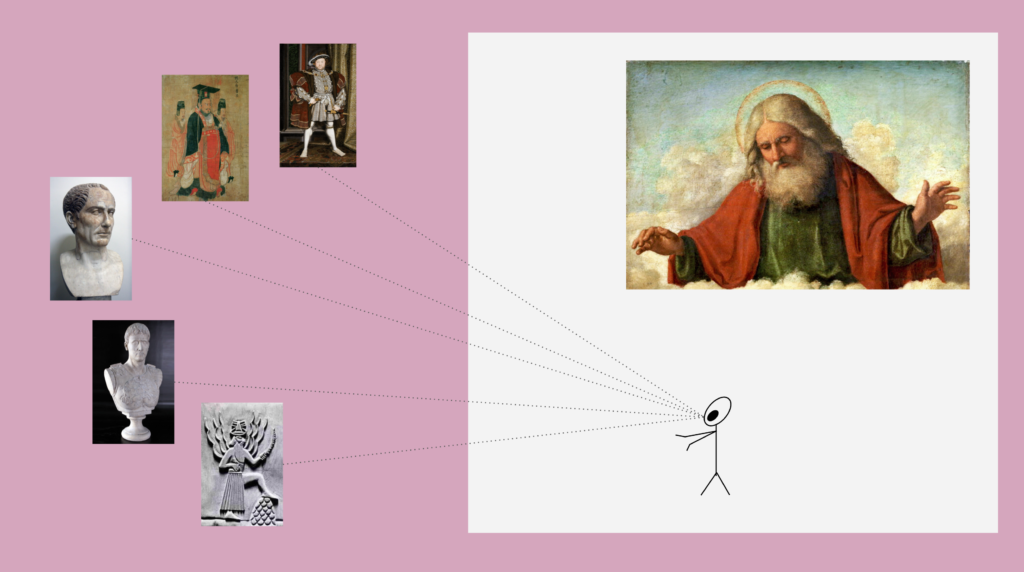
If I were religious I think the Sermon on the Mount [1] would be my principal guide because, at the community level, it seems a very naturally aligned ethical framework and way of life.
I would be Protestant [2] in that we all have a direct relationship with God with no trusted third party intermediaries.
I understand the logical problems that were inherited from the first few centuries [3]: How can God be one, but there is a Trinity?
I suspect monotheism [4] was a disintermediation of the previous order of power. One God is a better and less manipulable abstraction than having one God per city-state [5], or a pantheon with multiple deities [6] where authorities can add or subtract Gods to fit their political needs (e.g. ok, Caesar is God #137 and Augustus is God #138…who’s next?).
A higher generic and immutable God is more trust minimized (and more simple to process mentally, thus less costly [7]) in that it is a higher authority than the ephemeral rulers of the moment.
Then, the Church eventually gained similar power over that single God (e.g. money for salvation [8] and divine right of kings [9] – similar to the mandate of heaven in the case of Chinese philosophy [10]) and Protestantism was a second disintermediation, reaffirming again that direct relationship [11] with the higher abstraction rather than the local trusted bishops, kings, presidents, or dictators of the moment.
Communism [12] is a totally unnatural opposite extreme where, under the false excuse of political and economic freedom, they reject not only the order of power (or better said, they love the order of power in themselves), but reject God [13], the family, the community, and even the personhood of the individual.
As a friend once told me, Communism has a short half life and it is a bridge to industrialism [14].
References
[1] Sermon on the Mount – by Wikipedia: https://en.wikipedia.org/wiki/Sermon_on_the_Mount
[2] Protestant Reformation – by Wikipedia: https://en.wikipedia.org/wiki/Reformation
[3] First Council of Nicaea – by Wikipedia: https://en.wikipedia.org/wiki/First_Council_of_Nicaea
[4] Monotheism – by Wikipedia: https://en.wikipedia.org/wiki/Monotheism
[5] Sumerian religion – by Wikipedia: https://en.wikipedia.org/wiki/Sumerian_religion
[6] List of Roman Deities – by Wikipedia: https://en.wikipedia.org/wiki/List_of_Roman_deities
[7] Using Genetics and Brain Capacity to Model Reality – by Donald McIntyre: https://etherplan.com/2020/10/08/using-genetics-and-brain-capacity-to-model-reality/12920/
[8] Indulgence – by Wikipedia: https://en.wikipedia.org/wiki/Indulgence
[9] Divine right of kings – by Wikipedia: https://en.wikipedia.org/wiki/Divine_right_of_kings
[10] Mandate of Heaven – by Wikipedia: https://en.wikipedia.org/wiki/Mandate_of_Heaven
[11] Five solae – by Wikipedia: https://en.wikipedia.org/wiki/Five_solae
[12] Communism – by Wikipedia: https://en.wikipedia.org/wiki/Communism
[13] Works of Karl Marx 1843 – A Contribution to the Critique of Hegel’s Philosophy of Right – Introduction:
“Man makes religion, religion does not make man. Religion is, indeed, the self-consciousness and self-esteem of man who has either not yet won through to himself, or has already lost himself again. But man is no abstract being squatting outside the world. Man is the world of man – state, society. This state and this society produce religion, which is an inverted consciousness of the world, because they are an inverted world. Religion is the general theory of this world, its encyclopaedic compendium, its logic in popular form, its spiritual point d’honneur, its enthusiasm, its moral sanction, its solemn complement, and its universal basis of consolation and justification. It is the fantastic realization of the human essence since the human essence has not acquired any true reality. The struggle against religion is, therefore, indirectly the struggle against that world whose spiritual aroma is religion.
Religious suffering is, at one and the same time, the expression of real suffering and a protest against real suffering. Religion is the sigh of the oppressed creature, the heart of a heartless world, and the soul of soulless conditions. It is the opium of the people.”
Source: https://www.marxists.org/archive/marx/works/1843/critique-hpr/intro.htm
[14] Industrial revolution- by Wikipedia: https://en.wikipedia.org/wiki/Industrial_Revolution